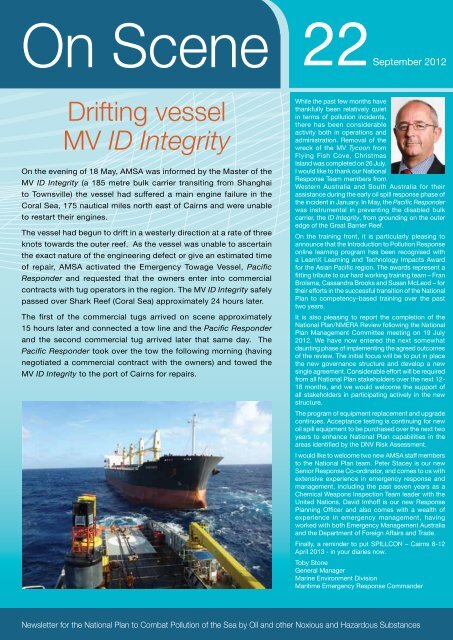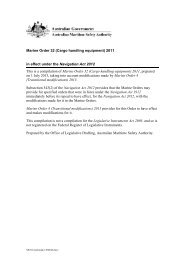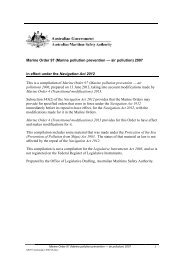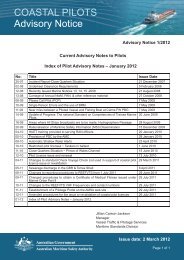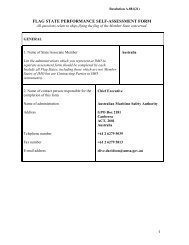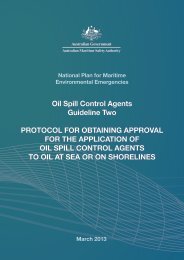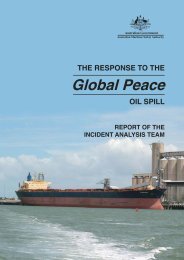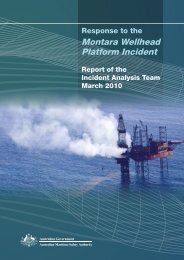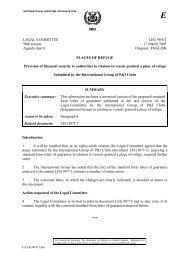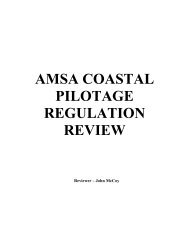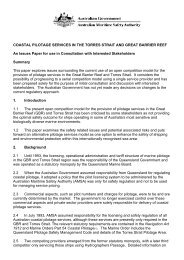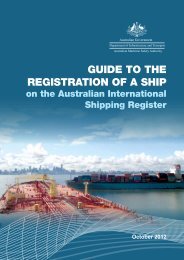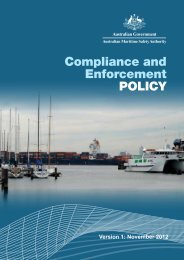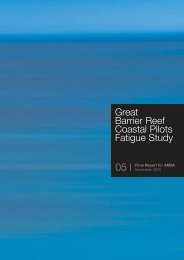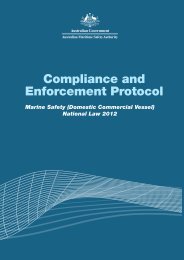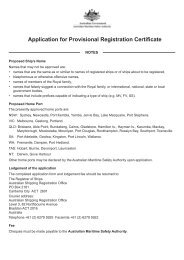Drifting vessel MV ID Integrity - Australian Maritime Safety Authority
Drifting vessel MV ID Integrity - Australian Maritime Safety Authority
Drifting vessel MV ID Integrity - Australian Maritime Safety Authority
Create successful ePaper yourself
Turn your PDF publications into a flip-book with our unique Google optimized e-Paper software.
On Scene<br />
<strong>Drifting</strong> <strong>vessel</strong><br />
<strong>MV</strong> <strong>ID</strong> <strong>Integrity</strong><br />
On the evening of 18 May, AMSA was informed by the Master of the<br />
<strong>MV</strong> <strong>ID</strong> <strong>Integrity</strong> (a 185 metre bulk carrier transiting from Shanghai<br />
to Townsville) the <strong>vessel</strong> had suffered a main engine failure in the<br />
Coral Sea, 175 nautical miles north east of Cairns and were unable<br />
to restart their engines.<br />
The <strong>vessel</strong> had begun to drift in a westerly direction at a rate of three<br />
knots towards the outer reef. As the <strong>vessel</strong> was unable to ascertain<br />
the exact nature of the engineering defect or give an estimated time<br />
of repair, AMSA activated the Emergency Towage Vessel, Pacific<br />
Responder and requested that the owners enter into commercial<br />
contracts with tug operators in the region. The <strong>MV</strong> <strong>ID</strong> <strong>Integrity</strong> safely<br />
passed over Shark Reef (Coral Sea) approximately 24 hours later.<br />
The first of the commercial tugs arrived on scene approximately<br />
15 hours later and connected a tow line and the Pacific Responder<br />
and the second commercial tug arrived later that same day. The<br />
Pacific Responder took over the tow the following morning (having<br />
negotiated a commercial contract with the owners) and towed the<br />
<strong>MV</strong> <strong>ID</strong> <strong>Integrity</strong> to the port of Cairns for repairs.<br />
22September 2012<br />
While the past few months have<br />
thankfully been relatively quiet<br />
in terms of pollution incidents,<br />
there has been considerable<br />
activity both in operations and<br />
administration. Removal of the<br />
wreck of the <strong>MV</strong> Tycoon from<br />
Flying Fish Cove, Christmas<br />
Island was completed on 26 July.<br />
I would like to thank our National<br />
Response Team members from<br />
Western Australia and South Australia for their<br />
assistance during the early oil spill response phase of<br />
the incident in January. In May, the Pacific Responder<br />
was instrumental in preventing the disabled bulk<br />
carrier, the <strong>ID</strong> <strong>Integrity</strong>, from grounding on the outer<br />
edge of the Great Barrier Reef.<br />
On the training front, it is particularly pleasing to<br />
announce that the Introduction to Pollution Response<br />
online learning program has been recognised with<br />
a LearnX Learning and Technology Impacts Award<br />
for the Asian Pacific region. The awards represent a<br />
fitting tribute to our hard working training team – Fran<br />
Brolsma, Cassandra Brooks and Susan McLeod – for<br />
their efforts in the successful transition of the National<br />
Plan to competency-based training over the past<br />
two years.<br />
It is also pleasing to report the completion of the<br />
National Plan/NMERA Review following the National<br />
Plan Management Committee meeting on 19 July<br />
2012. We have now entered the next somewhat<br />
daunting phase of implementing the agreed outcomes<br />
of the review. The initial focus will be to put in place<br />
the new governance structure and develop a new<br />
single agreement. Considerable effort will be required<br />
from all National Plan stakeholders over the next 12-<br />
18 months, and we would welcome the support of<br />
all stakeholders in participating actively in the new<br />
structure.<br />
The program of equipment replacement and upgrade<br />
continues. Acceptance testing is continuing for new<br />
oil spill equipment to be purchased over the next two<br />
years to enhance National Plan capabilities in the<br />
areas identified by the DNV Risk Assessment.<br />
I would like to welcome two new AMSA staff members<br />
to the National Plan team. Peter Stacey is our new<br />
Senior Response Co-ordinator, and comes to us with<br />
extensive experience in emergency response and<br />
management, including the past seven years as a<br />
Chemical Weapons Inspection Team leader with the<br />
United Nations. David Imhoff is our new Response<br />
Planning Officer and also comes with a wealth of<br />
experience in emergency management, having<br />
worked with both Emergency Management Australia<br />
and the Department of Foreign Affairs and Trade.<br />
Finally, a reminder to put SPILLCON – Cairns 8-12<br />
April 2013 - in your diaries now.<br />
Toby Stone<br />
General Manager<br />
Marine Environment Division<br />
<strong>Maritime</strong> Emergency Response Commander<br />
Newsletter for the National Plan to Combat Pollution of the Sea by Oil and other Noxious and Hazardous Substances
National Plan Management<br />
Committee sets new direction<br />
for the National Plan and NMERA<br />
The National Plan Management<br />
Committee’s meeting in Sydney on<br />
19 July proved to be a landmark<br />
meeting in the almost 40 year history<br />
of the National Plan. The Committee<br />
agreed to implement a comprehensive<br />
package of outcomes arising from the<br />
2011/12 Review of the National Plan<br />
and the National <strong>Maritime</strong> Emergency<br />
Response Arrangements (NMERA).<br />
The outcomes draw from the two<br />
projects undertaken during the review,<br />
but most importantly the more than<br />
90 stakeholders from Australia and<br />
overseas that were contacted during<br />
the process, including representatives<br />
from relevant Commonwealth and state<br />
government authorities, the shipping<br />
industry, the offshore petroleum<br />
industry, port authorities and harbour<br />
masters, emergency towage/salvage<br />
contractors, oil spill response service<br />
providers, wildlife response agencies<br />
and associated service providers.<br />
It was found that despite the many<br />
challenges facing AMSA and the<br />
other public and private organisations<br />
involved in oil spill preparedness<br />
and response, the National Plan<br />
and NMERA have served Australia<br />
relatively well over the last ten years.<br />
Nevertheless, concerns regarding the<br />
current and future management and<br />
implementation of the National Plan<br />
and NMERA were raised, as well as<br />
potential areas for improvement.<br />
The outcomes represent a number of<br />
fundamental changes to the National<br />
Plan in particular. The National Plan<br />
to Combat Pollution of the Sea by Oil<br />
and Other Noxious and Hazardous<br />
Substances and the National <strong>Maritime</strong><br />
Emergency Response Arrangements<br />
will be combined and supported by a<br />
single agreement that will:<br />
• provide clearer linkages to Australia’s<br />
obligations as a signatory to the<br />
International Convention on Oil<br />
Pollution Preparedness, Response<br />
and Co-operation 1990 and its 2000<br />
Protocol dealing with Hazardous<br />
and Noxious Substances;<br />
• be more closely aligned to<br />
Commonwealth and State/<br />
NT emergency management<br />
arrangements; and<br />
• provide a new governance structure,<br />
with oversighting by a National Plan<br />
Strategic Coordination Committee<br />
with membership comprising<br />
Commonwealth and State/NT<br />
Governments, with a National Plan<br />
Strategic Industry Advisory Forum<br />
responsible for providing industryfocused<br />
advice on strategic issues.<br />
A new committee will be established<br />
and contingency plan developed<br />
to provide an increased focus on<br />
preparing for and managing incidents<br />
in Commonwealth waters.<br />
While a $25 million program of<br />
equipment replacement and<br />
refurbishment is already well under<br />
way, the two National Plan equipment<br />
stockpiles adjacent to the ‘very high’<br />
risk areas identified in the DNV Risk<br />
Assessment – Dampier and Townsville –<br />
will be upgraded. New standards will be<br />
developed for equipment storage and<br />
maintenance in all nine of the marine<br />
equipment stockpiles.<br />
To assist in the implementation of<br />
competency based training, AMSA will<br />
provide resources to assist the States/<br />
NT to:<br />
• align their training with the AMSA<br />
Registered Training Organisation;<br />
and<br />
• adapt existing training to a<br />
competency based framework,<br />
with a view to establishing nationally<br />
consistent training outcomes.<br />
Other outcomes include:<br />
• adoption of the Australasian Inter-<br />
Service Incident Management<br />
System (AIIMS);<br />
• development of succession plans<br />
to expand personnel experience<br />
across all levels of response;<br />
• more frequent national exercises to<br />
be rotated between jurisdictions;<br />
• enhancements to the Oil Spill<br />
Response Atlas and cost recovery<br />
arrangements;<br />
• development of an incident<br />
management framework for salvage<br />
incidents;<br />
• formal arrangements with the<br />
CSIRO to provide scientific advisory<br />
services to the National Plan; and<br />
• development of a national oiled<br />
wildlife capability and upgraded<br />
oiled wildlife resources within the<br />
national equipment stockpiles.<br />
The implementation of these changes<br />
will involve considerable effort by<br />
AMSA and all of the stakeholders in the<br />
new ‘National Plan’ over the next 12-<br />
18 months, but will ensure Australia’s<br />
capability to respond to maritime<br />
casualties and pollution incidents<br />
remains effective.<br />
2
National Plan Training<br />
– Winners of LearnX<br />
Asia-Pacific Awards<br />
AMSA’s Introduction to Pollution Response online learning program<br />
has been recognised with a LearnX Learning and Technology<br />
Impacts Award for Asia Pacific region, for its innovation and<br />
effectiveness in delivering National Plan Training to a national and<br />
international audience.<br />
The course won first prize for Best Learning Program -<br />
Environmental, while Fran Brolsma, Cassandra Brooks and Susan<br />
McLeod came second in the Best Talent - Learning Team category.<br />
In 2010, the MED learning and development team transitioned<br />
National Plan Training to be competency-based, introducing an<br />
online system for knowledge development. This had a number of<br />
benefits:<br />
• participants could complete at their own pace, in their own time<br />
and stop and start as required which meant they spent less time<br />
away from work;<br />
SPILLCON<br />
2013<br />
Planning is underway for the 13th Asia-<br />
Pacific Oil Spill Prevention and Preparedness<br />
Conference, Spillcon 2013. The event will<br />
take place at the Cairns Convention Centre,<br />
Queensland, Australia from 8-12 April 2013.<br />
Held every three years, Spillcon operates in<br />
cooperation with the International Oil Spill<br />
Conference (IOSC) in the United States, and<br />
Interspill in Europe. This alignment enhances<br />
regional and global knowledge sharing<br />
capabilities and provides greater resources<br />
for addressing global oil spill issues.<br />
Spillcon 2013 will bring together 400 delegates<br />
and 30 exhibitors from all around the world,<br />
across industry, government and the service<br />
sectors. They will be able to keep abreast of<br />
major developments in the field, view new<br />
products and technologies, interact with<br />
subject matter experts and discuss issues<br />
including oil spill cause and prevention,<br />
preparedness, response management and<br />
environmental issues. The conference will also<br />
include an impressive on-water display.<br />
The AMSA marketing team are the secretariat for<br />
the Spillcon 2013 arrangements, in consultation<br />
with an organising committee which comprises<br />
industry and government representatives.<br />
Further details, as they develop, will be<br />
published to www.spillcon.com.<br />
• participants could spend as much time as they needed on the<br />
course utilising the resource materials that were included with<br />
the benefit of being able to go as far into the information as they<br />
desired; and<br />
• participants were able to attend each course with the same level<br />
of knowledge and understanding.<br />
The team has successfully delivered excellent outcomes for<br />
the NRT, including motivated individuals and teams throughout<br />
Australia in a very technical area. The initiative has received<br />
accolades from other global maritime administrators keen to move<br />
into competency based training in this area.<br />
SPILLCON<br />
2013<br />
GLOBAL REGIONAL LOCAL<br />
3
ESC Workshop<br />
The 21st Annual Environment and Scientific Coordinator<br />
(ESC) Workshop was held in Townsville, Queensland, on 6-9<br />
August 2012, co-hosted by GBRMPA and AMSA. The aim of<br />
the annual workshop is to enhance the national capability to<br />
protect the marine environment from ship sourced pollution<br />
by encouraging the National Plan environmental and scientific<br />
personnel to share their expertise, knowledge and experience<br />
of the science behind oil spill response.<br />
The workshop attracted around 40 delegates from all<br />
jurisdictions, including the states, the Commonwealth,<br />
GBRMPA, New Zealand, NT and representatives from AMSA’s<br />
Marine Environment Division. This year invitations were<br />
also extended to delegates from NOPSEMA, SEWPaC and<br />
industry. This provided them with an opportunity to both better<br />
understand the value, purpose and role of the Workshop and<br />
Network, and to contribute their knowledge and experience.<br />
We hope all participants will be motivated to attend and run<br />
future events including local seminars and ESC events.<br />
Workshop participants took the opportunity to refresh their<br />
oil spill response knowledge and learn new skills - seminars,<br />
lectures, discussions, practical sessions and networking<br />
all provide opportunities for professional development. The<br />
workshop started with a 2-hour table-top exercise in pollution<br />
response to get participants thinking about oil pollution impact<br />
and protection priorities, and to set the scene for the following<br />
days.<br />
The workshop was treated to presentations from a range<br />
of local guest speakers presenting topics as varied as the<br />
sensitivities of tropical habitats and species, jurisdictional<br />
developments and projects, and new developments in the use<br />
of oil and chemical trajectory models as decision support tools.<br />
A practical session on testing the effectiveness of oil<br />
dispersants gave participants a very hands-on (gloves-on!)<br />
experience. Visits to the Great Barrier Reef Vessel Tracking<br />
Service (REEFVTS) Headquarters, Reef HQ, the Aquarium<br />
and the Turtle Hospital reinforced the presentations from<br />
local experts about the environmental sensitivity of the Great<br />
Barrier Reef habitats.<br />
This year’s workshop reinforced the focus on the technical<br />
aspects of the functions and roles of ESCs in preparation and<br />
response, using local examples to illustrate broader technical<br />
processes. This built on the work of last year’s workshop, and<br />
added the outcomes of the National Plan Review and recent<br />
response experience, to continue to reinvigorate participants’<br />
involvement in their home jurisdictions and in the national ESC<br />
Network. MED has a vision that the ESC Network will become<br />
a (inter)nationally recognised expert resource.<br />
The general feedback from both participants and organisers<br />
suggests that this one of the best ESC workshops in recent<br />
years.<br />
4
AMSA Welcomes<br />
David Imhoff<br />
Response Planning Officer<br />
David has been appointed on a two-year<br />
fixed term contract as the Response<br />
Planning Officer. David was previously<br />
employed by Emergency Management<br />
Australia (EMA). David’s EMA experience<br />
includes managing the security of<br />
Australia’s High Office Holders in<br />
Australia and abroad, managing the<br />
<strong>Australian</strong> Government Continuity<br />
Arrangements and in emergency<br />
management planning, coordination<br />
and policy development. Prior to EMA,<br />
David worked in the Department of<br />
Foreign Affairs and Trade in Consular<br />
and Emergency Management Roles.<br />
David is responsible for providing<br />
assistance in all aspects of spill response<br />
planning for AMSA.<br />
Peter Stacey<br />
Peter joined AMSA in July 2012 from the<br />
United Nations, where he spent seven<br />
years as a Chemical Weapons Inspection<br />
Team Leader.<br />
During a career in emergency response<br />
and management, Peter has worked<br />
in forensic counter terrorism with the<br />
NSW Police, emergency management<br />
and hazardous materials response<br />
with the NSW Fire Brigades and spent<br />
secondment periods with both<br />
the NSW Environment Protection<br />
<strong>Authority</strong> and Planning NSW in<br />
emergency management and the<br />
control of major hazards facilities.<br />
Peter’s qualifications are in science<br />
and management and he holds<br />
memberships of the American<br />
Chemical Society and The International<br />
Emergency Management Society.<br />
Clare Stewart<br />
Clare Stewart has recently<br />
undertaken the role of Logistics<br />
and Administration Officer while<br />
Susan McLeod is on maternity leave.<br />
Clare is responsible for coordinating<br />
training activities, facilitating budget<br />
information, providing assistance<br />
and advice on behalf of AMSA at<br />
pollution incidents, assisting with<br />
Audits and inspections of AMSA’s<br />
National Plan oil spill response<br />
programs and preparing input to<br />
reports on inspection findings and<br />
recommendations, along with general<br />
administrative assistance. Prior<br />
to joining the Marine Environment<br />
Division team, Clare spent 20 months<br />
as a Shipping Registration Officer in<br />
the <strong>Maritime</strong> Operations Division of<br />
AMSA.<br />
New<br />
Liability<br />
Limits<br />
Agreed<br />
Following the Pacific Adventurer<br />
incident in 2009, Australia commenced<br />
work in the Legal Committee of the<br />
International <strong>Maritime</strong> Organization<br />
(IMO) to increase the limits of<br />
liability for maritime claims under<br />
the International Convention on<br />
Limitation of Liability for <strong>Maritime</strong><br />
Claims (LLMC). Australia argued<br />
that the current limits are too low<br />
to meet international and national<br />
expectations and that the polluter<br />
should pay for damages resulting from<br />
an oil spill. Australia was successful in<br />
having the issue added to the Legal<br />
Committee agenda for consideration<br />
In order for the matter to be formally<br />
discussed, Australia needed to<br />
secure agreement from 19 countries<br />
to co-sponsor Australia’s proposal to<br />
increase the limits on liability under<br />
the Convention. This was achieved<br />
in late 2010 and the proposal by<br />
Australia, with 20 co-sponsors, was<br />
submitted to the IMO in November<br />
2010.<br />
The matter was considered by the<br />
99th Session of the IMO Legal<br />
Committee in April 2012. The<br />
Committee agreed an increase of<br />
51 per cent of the current LLMC<br />
limits. The entry into force of the<br />
new limits will be 8 June 2015.<br />
Some legislative amendment will be<br />
required in due course to give effect<br />
to these changes.<br />
From left: Peter Stacey, Clare Stewart, David Imhoff<br />
5
Training<br />
Changes in the National Plan training team<br />
With Fran Brolsma returning to Perth recently, Mick Fleming<br />
has moved into the National Plan training team. Mick was<br />
the Senior Response Coordinator in Marine Environment<br />
Division and brings 25 years operational experience and<br />
incident control systems knowledge into the training team.<br />
Mick has previous training experience with appointments as<br />
a Senior Educational Officer with Emergency Management<br />
Australia and as Manager Regional Training with Queensland<br />
Fire & Rescue Service.<br />
Fran Brolsma is staying with the National Plan training<br />
team working on specific projects to assist in National Plan<br />
objectives.<br />
Cassandra Brooks has accepted a position with NSW<br />
Transport in the Marine Pollution Section and leaves AMSA<br />
on 21 September 2012. We would like to thank Cassandra<br />
for her contribution to National Plan training.<br />
Susan McLeod is still based in the Canberra office providing<br />
advice and support to National Plan stakeholders. Susan<br />
will however be managing a higher priority project with the<br />
arrival of her first baby and will be taking some time out on<br />
maternity leave.<br />
Clare Stewart has moved in Susan’s position for the next 12<br />
months providing Logistics and Administration to the Marine<br />
Environment Pollution Response section.<br />
National Plan Courses<br />
A number of competency based programs have now<br />
been completed and continue to provide a consistent and<br />
measurable standard in marine pollution management.<br />
There have been six Incident Management Team (IMT)<br />
courses attended by 84 participants. The IMT is the core<br />
course designed for those who could be expected to<br />
perform in a functional management role during a marine<br />
pollution incident. AMSA has also conducted IMT courses<br />
in Darwin for 18 participants, Vietnam for 27 participants<br />
and Philippines for 25 participants.<br />
A number of specialist competency based programs have<br />
also been conducted. Two Incident Controller courses<br />
have been conducted for 37 participants. A third Incident<br />
Controllers course is being conducted on the 10-14<br />
September 2012. An Operations Officer course was<br />
conducted for 14 participants with the next course planned<br />
for 19-23 November 2012. A Logistics Officer course was<br />
conducted for 16 participants with the next course planned<br />
for 29 April – 3 May 2012. The inaugural Planning Officer<br />
course is being held from the 22-26 October 2012.<br />
Online learning<br />
The online learning course: Introduction to Pollution<br />
Response has had in excess of 700 enrolments. This course<br />
is free and available online to anyone who wishes to gain<br />
an awareness of how pollution is combated in the marine<br />
environment under Australia’s National Plan. It is a pre<br />
requisite for anyone attending National Plan Training Courses<br />
managed by AMSA as it provides underpinning knowledge<br />
prior to attending the AMSA competency based training.<br />
The online learning is used throughout Australia and we<br />
have been informed that it has also been used in Vietnam,<br />
Philippines, Spain, China and New Zealand. Some schools<br />
are utilising some of the information as part of projects<br />
they are covering. In addition wildlife associations and<br />
environmental groups are contacting us to confirm they can<br />
use this resource. The Online Learning course - Introduction<br />
to Pollution Response, was awarded 1st place for the Best<br />
Environmental Learning Program in the Asia-Pacific region<br />
LearnX Learning and Technology Impacts Awards 2012.<br />
Operator Level Training – delivered under AMSA’s RTO<br />
by States/Territories<br />
The Department of Transport, WA, with assistance and<br />
advice from AMSA, has developed two competency based<br />
training courses which are being delivered under AMSA’s<br />
Registered Training Organisation (RTO).<br />
• Basis Equipment Operations Course<br />
– 7-8 March 2012 (20 participants)<br />
– 1-2 May 2012 (19 participants)<br />
– 23-24 July 2012 (9 participants)<br />
• Shoreline Response Course<br />
– 17-19 July 2012 (20 participants)<br />
First Accredited Oiled Shoreline Training Course for WA<br />
Department of Transport<br />
After months of preparation and liaison with AMSA, the<br />
Department of Transport (DoT) delivered its first accredited<br />
Oiled Shoreline Training course at Dampier in July 2012. The<br />
course is a three day trainer led event with classroom based<br />
delivery and activities combined with practical tasks in the<br />
field. Its target audience is those who would undertake a<br />
Team Leader role in assessment and / or clean-up during<br />
a marine pollution incident that could or has resulted in a<br />
shoreline impact. The course incorporates the three Units<br />
of Competency that AMSA developed with input from the<br />
States and Territories:<br />
• PUAOIL402 Apply oiled shoreline assessment strategies<br />
in an oil spill response<br />
• PUAOPPUAOIL301 Apply health and safety risk controls<br />
when working on oiled shorelines<br />
• PUAOIL403 Lead a team in oiled shoreline clean-up.<br />
6
The training was delivered under ASMA’s RTO status.<br />
The increase in activity off the Pilbara coast in WA made<br />
Dampier an appropriate location for the initial course and<br />
the 20 participants included representatives from Dampier<br />
and Geraldton ports, Shire of Roebourne, Department of<br />
Mines and Energy, Woodside, Shell, BP, Dampier Salt and<br />
Murujuga Aboriginal Corporation.<br />
The course went well and was well received.<br />
Following development updates before and after the next<br />
course in Bunbury WA in October 2012 it’s hoped the team<br />
will have a robust and final product. DoT is happy to share<br />
the product with other States and Territories in Australia and<br />
will look at how to do that with those who are interested<br />
following the Bunbury course.<br />
Design and development of this course has involved a huge<br />
amount of DoT WA resource and significant input from<br />
AMSA. DoT would like to extend thanks to Fran Brolsma of<br />
AMSA for all the assistance and time given to assist with this<br />
project. A lot has been learned along the way and the DoT<br />
team will continue to grapple with the challenge of providing<br />
good quality, relevant training while meeting the needs of<br />
accreditation and assessment.<br />
Newsletter<br />
Now Online<br />
You can now help us reduce our environmental<br />
footprint by browsing this or past editions of<br />
On Scene on line at the AMSA website, just go to:<br />
www.amsa.gov.au/Publications<br />
If you would like to receive your own copy of<br />
On Scene straight to your inbox, simply send your<br />
email address to: Ashleigh.Tracey@amsa.gov.au<br />
On Scene is published by the <strong>Australian</strong> <strong>Maritime</strong><br />
<strong>Safety</strong> <strong>Authority</strong> as the manager of the National Plan<br />
to Combat the Pollution of the Sea by Oil and other<br />
Noxious and Hazardous Substances.<br />
For further information on items in this issue,<br />
please contact:<br />
Environment Protection<br />
Marine Environment Division<br />
<strong>Australian</strong> <strong>Maritime</strong> <strong>Safety</strong> <strong>Authority</strong><br />
GPO Box 2181 CANBERRA ACT 2601<br />
Phone: +61 2 6279 5933<br />
Email: eps@amsa.gov.au<br />
Editor: Ashleigh Tracey<br />
Design/layout: Tony Mills<br />
Participants undertaking an oiled shoreline assessment<br />
during the WA Oiled Shoreline Training Course in Dampier<br />
Printed on 100% recycled <strong>Australian</strong> made paper.<br />
7
October 2012<br />
What’s On<br />
Course Name Organisation Location Dates<br />
Core Group Workshop AMOSC Geelong, VIC 2 – 5 October 2012<br />
Shoreline Training Workshop<br />
Marine pollution Response Shoreline<br />
Responder Course<br />
Marine Oil Spill Management &<br />
Supervisory Training Course<br />
Marine pollution Response Operators<br />
Course<br />
Department of Transport -<br />
Western Australia<br />
Bunbury, WA 9 – 11 October 2012<br />
<strong>Maritime</strong> <strong>Safety</strong> Queensland Cairns, QLD 10 – 12 October 2012<br />
<strong>Maritime</strong> <strong>Safety</strong> New Zealand Auckland, NZ 15 – 16 October 2012<br />
<strong>Maritime</strong> <strong>Safety</strong> Queensland Cooktown, QLD 15 – 16 October 2012<br />
Planning Specialist Course AMSA Mount Macedon, VIC 22 – 26 October 2012<br />
Management Course AMOSC Geelong, VIC 22 – 26 October 2012<br />
Basic Operator Training Workshop<br />
November 2012<br />
Department of Training -<br />
Western Australia<br />
Geraldton, WA 30 – 31 October 2012<br />
Course Name Organisation Location Dates<br />
Marine pollution Response<br />
Operators Course<br />
Marine pollution Response Finance<br />
and Administration Course<br />
<strong>Maritime</strong> <strong>Safety</strong> Queensland Brisbane, QLD 6 – 8 November 2012<br />
<strong>Maritime</strong> <strong>Safety</strong> Queensland Brisbane, QLD 6 – 8 November 2012<br />
Operations Specialist Course AMSA Mount Macedon, VIC 19 – 23 November 2012<br />
Regional Responders Revalidation<br />
Training Course<br />
Marine pollution Response<br />
Shoreline Responder Course<br />
<strong>Maritime</strong> <strong>Safety</strong> New Zealand Christchurch, NZ 20 – 22 November 2012<br />
<strong>Maritime</strong> <strong>Safety</strong> Queensland Gladstone, QLD 27 – 29 November 2012<br />
December 2012<br />
Course Name Organisation Location Dates<br />
Marine pollution Response<br />
Advanced operators Course<br />
February 2013<br />
<strong>Maritime</strong> <strong>Safety</strong> Queensland Brisbane, QLD 6 – 8 November 2012<br />
Course Name Organisation Location Dates<br />
Regional Responders Initial Training<br />
Course<br />
Incident Management Team (IMT)<br />
Course<br />
March 2013<br />
<strong>Maritime</strong> <strong>Safety</strong> New Zealand Auckland, NZ 12 – 15 February 2013<br />
AMSA Mount Macedon, VIC 18 – 22 February 2013<br />
Course Name Organisation Location Dates<br />
Marine Oil Spill Management &<br />
Supervisory Training Course<br />
Marine pollution Response<br />
Operators Course<br />
<strong>Maritime</strong> <strong>Safety</strong> New Zealand Wellington, NZ 5 – 6 March 2013<br />
<strong>Maritime</strong> <strong>Safety</strong> Queensland Gladstone, QLD 12 – 14 March 2013<br />
For further information on national plan training:<br />
www.amsa.gov.au/Marine_Environment_Protection/National_plan/Training_Program/index.asp<br />
8


